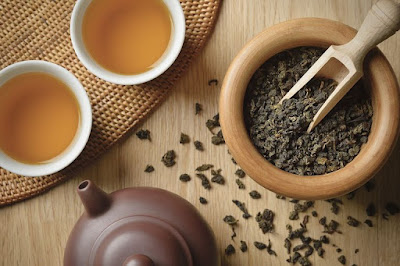The Benefits of Oolong Tea
Can sipping this distinctly mellow tea boost your health?
A lesser-known type of tea, oolong tea is made from the leaves of the Camellia sinensis plant, the same plant used to make black and green tea. Unlike black tea, which is oxidized until the leaves turn a deep black color, oolong tea is partially oxidized. (Green tea leaves are steamed or pan-fired during processing, which keeps them from oxidizing.)
The Benefits of Oolong Tea
Oolong tea may offer certain health benefits when sipped regularly, according to proponents.
Health claims for oolong tea's benefits include reduction of cholesterol levels, preservation of heart health, treatment of digestive disorders, strengthening of the immune system, and formation of strong bones.
Here's a look at several key study findings:
1) Heart Disease
In a population study published in the Journal of Epidemiology and Community Health in 2011, researchers found that consumption of oolong tea was linked to a reduced risk of mortality from cardiovascular disease. Participants included 76,979 adults, all of whom were ages 40 to 79 and free of stroke, heart disease, and cancer at the start of the study. In surveying study members about their beverage consumption, the researchers determined that those who drank coffee, green tea, and/or oolong tea on a regular basis had a lower risk of heart disease (compared to those who didn't drink such beverages).
Related: Tea for Heart Disease
2) Diabetes
When paired with standard care, oolong may benefit people with type 2 diabetes, according to a small study published in Diabetes Care in 2003. After drinking 1,500 ml of oolong tea daily for 30 days, study participants (all of whom took oral diabetes medication as prescribed) experienced a greater reduction in blood sugar levels compared to those who drank water instead of tea.
Since the study only involved a total of 20 people with diabetes, the results need to be confirmed in larger studies.
Other studies that have investigated the association between tea consumption and diabetes risk have showed inconsistent results, with one study even finding a moderate positive association. The study, published in Diabetic Medicine in 2011, looked at data from 4975 male workers in Japan from 1999 to 2004 and found that oolong tea consumption was associated with an increased the risk of type 2 diabetes.
Researchers cite pesticide residue in tea as a possible mechanism (a higher blood levels of DDT have been associated with a high prevalence of diabetes in the 1999-2002 National Health and Nutrition Examination Survey). It could be that those with or at risk for diabetes drink oolong because it is regarded as a healthy beverage.
Related: Natural Remedies for Diabetes
3) Weight Loss
Several studies indicate that oolong tea may help promote weight loss. In a 2009 study of 102 overweight or obese subjects, for instance, researchers concluded that consumption of oolong tea could improve fat metabolism and, in turn, reduce body weight.
After six weeks of drinking oolong tea daily, 64 percent of obese subjects and 66 percent of overweight subjects lost more than 2.2 pounds. Overall, 22 percent of participants lost more than 6.6 pounds.
Previous studies suggest that oolong tea's anti-obesity effects might be due to its caffeine or polyphenol content.
The Takeaway
Although oolong tea can be a delicious addition to your beverage rotation, it's too soon to view it as a treatment for any condition. And while it may offer certain health benefits, it's important to consult your healthcare provider to determine how much might be appropriate for you. In some people, large amounts of caffeine may lead to a number of adverse effects (such as anxiety, increased heart rate and blood pressure, and the worsening of ulcer symptoms) or may not be right if you have certain conditions or are taking medication.
Sources:
Hayashino Y, Fukuhara S, Okamura T, Tanaka T, Ueshima H; HIPOP-OHP Research Group. High oolong tea consumption predicts future risk of diabetes among Japanese male workers: a prospective cohort study. Diabet Med. 2011 Jul;28(7):805-10.
He RR, Chen L, Lin BH, Matsui Y, Yao XS, Kurihara H. Beneficial effects of oolong tea consumption on diet-induced overweight and obese subjects. Chin J Integr Med. 2009 15(1):34-41.
Hosoda K, Wang MF, Liao ML, et al. Antihyperglycemic effect of oolong tea in type 2 diabetes. Diabetes Care. 2003 26(6):1714-8.
Mineharu Y, Koizumi A, Wada Y, et al. Coffee, green tea, black tea and oolong tea consumption and risk of mortality from cardiovascular disease in Japanese men and women. J Epidemiol Community Health. 2011 Mar;65(3):230-40. 8.
Rumpler W, Seale J, Clevidence B, et al. Oolong tea increases metabolic rate and fat oxidation in men. J Nutr. 2001 131(11):2848-52.
Disclaimer: The information contained on this site is intended for educational purposes only and is not a substitute for advice, diagnosis or treatment by a licensed physician. It is not meant to cover all possible precautions, drug interactions, circumstances or adverse effects. You should seek prompt medical care for any health issues and consult your doctor before using alternative medicine or making a change to your regimen.
 RSS Feed
RSS Feed Twitter
Twitter

























 2:32 PM
2:32 PM
 Unknown
Unknown

 Posted in
Posted in 